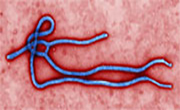High-risk situation led doctor to get immunization; no serious illness developed
THURSDAY, March 5, 2015 (HealthDay News) — An experimental Ebola vaccine may have prevented the disease in a doctor who was at high risk of infection, according to a new report. The findings were published online March 5 in the Journal of the American Medical Association.
In the new case report, researchers led by Mark Mulligan, M.D., of Emory University in Atlanta, said the 44-year-old doctor experienced a needlestick last September at an Ebola clinic in Sierra Leone. He agreed to receive the experimental vaccine after he was exposed. The doctor’s body fought off the virus with a strong, targeted reaction — suggesting that VSVΔG-ZEBOV may be helpful in preventing infection. However, the researchers said that it’s still too early to know if the vaccine is actually safe and effective.
The doctor returned to the United States for treatment and follow-up. About 14 hours after receiving the vaccine, the doctor developed symptoms, such as fever, nausea, and muscle aches. He continued having symptoms the next day, but on days three through five after receiving the vaccine, his symptoms improved, and he was symptom-free by day seven, Mulligan’s team said. “Future decision-making about using this experimental vaccine for postexposure vaccination will need to balance the risks of harm from the vaccine or possible Ebola infection (both were unknowns at the time of the patient’s exposure) against the possible benefit of vaccination (also unknown at the time of the patient’s treatment),” the study authors write.
Thomas Geisbert, Ph.D., is a professor of microbiology and immunology at the University of Texas Medical Branch at Galveston, and also the author of an editorial accompanying the new study. Speaking with HealthDay, he said that “the article reinforces the need for fast-acting single-injection preventive vaccines to control and manage outbreaks.” If proven safe and effective in humans, the single-dose shot “would have great utility for things like vaccinating health care workers and first responders, say, right before you put them on an airplane to go into the hot zone.”
Copyright © 2015 HealthDay. All rights reserved.








